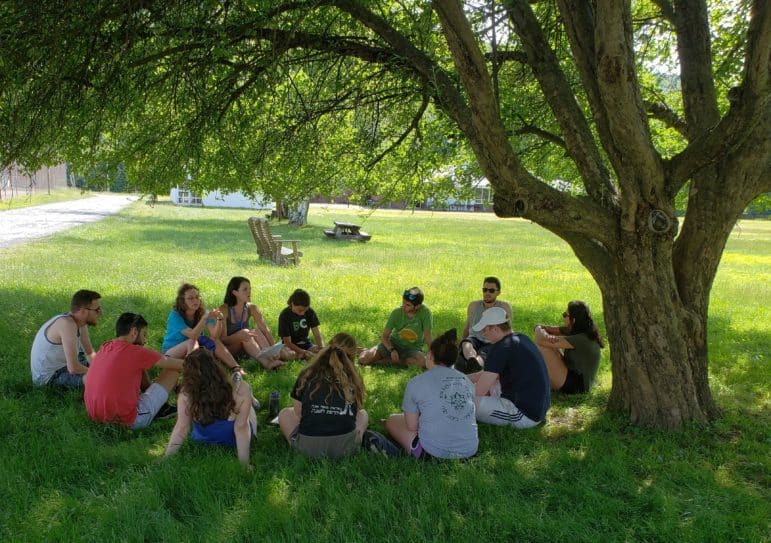
Helping CITs and Teaching Assistants navigate a new setting
A new Moving Traditions program for counselors-in-training (CITs) and teaching assistants (TAs) in Jewish contexts helps guide future staff members through eight essential conversations regarding their role in promoting the wellbeing and emotional development of children.
The program gives any supervisor of CITs or TAs an easy-to-use curriculum that covers topics including empathic listening, communication, gender codes, peer pressure, setting boundaries, giving feedback, consent, and the role of mentorship. For each session there are guides to designing conversations around the topic, personal explorations for staff to consider, and multiple ways to explore Jewish values connected to the underlying issues. The program is designed so that even if you have only 45-60 minute time slots with a small group, you can engage them in a meaningful professional development experience that will support their emotional wellbeing and support them in caring for children.
How it works:
Moving Traditions will train any staff using or supervising the program with a one-hour orientation, give them online access to the curriculum portal (the portal allows you to construct your own session and has built in cut and paste functions), and provide your organization with ongoing support as needed. We also ask all partners to speak with us after they have trained their staff and seen the impact so that we both can learn from the experience and refine the curriculum for future users.
Ready to take the next step?
Still have questions? Schedule a tour of our Curriculum Portal with one of our Regional Directors. Or, if you’re ready to become a partner, get started on the application.
Overview
The series takes teens through a set of educational experiences that help them to connect to their peers and support each other in their social, emotional, and spiritual growth.
The sessions are focused primarily around three of the Ten Tasks of Adolescence as outlined by youth mental health advocate Dr. A. Rae Simpson. These three tasks (in bold) are:
- Develop and apply new perspectives on human relationships.
In this series, teens will learn about perspective taking and conflict resolution. Teens will practice understanding situations both from the perspective of the camper/student and the counselor/teacher so that they can visualize empathic and supportive responses to common situations. - Develop and apply new coping skills in areas such as decision making and problem solving.
The CITs/ teaching assistants will practice decision making in all kinds of situations, exploring the nuances when elements of the scenario change. They will identify when they are equipped to manage the situation and when to ask for help from a peer or a supervisor. - Meet the demands of increasingly mature roles and responsibilities.
As this is often a first job, this series of educational experiences will help teens to better understand their role as a responsible provider of childcare. They will leave feeling more confident that they can provide guidance, care, and mentorship to the young people that they are supporting.
Curriculum Outline
| Session Title | Purpose | Summary |
|---|---|---|
| Communicating with Kindness | Help CITs and Teaching Assistants to define their role | Participants begin to explore the expectations of the role, affirming their instincts and thinking through various scenarios. |
| Managing Responsibilities | Help CITs and Teaching Assistants to know when to ask for help | Participants are introduced to hypothetical scenarios for reflection and learning from their experiences. |
| Noticing Yourself and Others | Helps CITs and Teaching Assistants to understand the social and emotional lives of campers | Participants turn their focus to the children with which they work and the possible motivations for their behavior. |
| Setting Boundaries and Engaging in Appropriate Physical Connection | Help CITs and Teaching Assistants to take steps to set boundaries and be supportive | Participants practice boundary setting and appropriate physical interactions. |
| Managing Up | Help CITs and Teaching Assistants to be effective communicators around values and boundaries | This session helps participants appreciate organizational dynamics and practice advocating within the system. |
| Identifying Stressors | Help CITs and Teaching Assistants to recognize how attention affects perception | Participants learn to pay attention to the situation around them and what’s going on inside themselves, then take action. |
| De-Escalating Conflict | Help CITs and Teaching Assistants to use non-violent communication techniques | Participants learn how to disrupt behavior and redirect energy. |
| Siyyum Celebration | Help CITs and Teaching Assistants to reflect on what they have learned and envision their next steps | This session celebrates successes so far and makes plans for ongoing learning. |
The strategies used to train the teens in this series involve specific skill building as well as examining different scenarios and a case study protocol. This practice, central to training teachers, introduces complexity and demonstrates how practitioners learn from mistakes and ongoing reflection with colleagues. Developmentally, it is important for teens to move from a defensive stance to one that uses experience as a vehicle for growth and trusts peers and superiors to give meaningful feedback.
Each session is written as a 55-minute lesson, but timing can be adjusted as you see fit. In addition, some supplies are used or videos are linked, but the sessions are overall quite light on materials. We designed the sessions this way so that they were flexible enough for you to implement them whenever and wherever you see fit. Each session also includes Jewish texts and teachings that ground the experience in a values-based approach to caring for yourself and for others.
Donate
Your gift to Moving Traditions emboldens Jewish youth to thrive through the pursuit of personal wellbeing (shleimut), caring relationships (hesed), and a Jewish and feminist vision of equity and justice (tzedek).